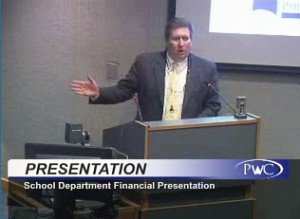
In a presentation to the Prince William Board of County Supervisors, School Board Chairman-At-Large Milt Johns stated that budget cuts proposed by Chairman-At-Large Corey Stewart’s flat tax bill, might forces the school division to eliminate popular programs and delay funding of new schools.
“An additional 12 million dollar cut in the funding that we are receiving, I believe, will significantly change the education system that we deliver to the citizens,” Johns said.
The school budget reflects state and federal requirements on funding special education and ESOL, though much of the funding comes from local jurisdictions.
“There is sort of this notion out there that there is a bloated bureaucracy, I have this image of guys in tuxedo smoking cigars and lighting them with 100 dollar bills, but the fact of the mater is that the vast majority of our budget is mandatory,” Johns said.
In addition, Johns said the School Board struggles to meet the rate of growth in the county, which amounts to approximately 2,000 new students coming into the district every year, or the equivalent of one new high school every year.
Due to the rate of growth, even while the School Board continues to build new schools, Johns claims they can never keep pace with new students entering the district. Therefore, students remain in trailers at schools that are overcapacity.
Johns said these mounting costs leave little room for the School Board to decrease the budget, unless they cut programs that are popular.
“It will be very difficult to not look at the strategic programs or choice programs, that at least based on the feedback that we get, are very popular in the community: full day kindergarten, specialty programs, sports programs. Those are things that are not mandated by the state, and we’re getting to the point that we’re going to have to move in down direction,” Johns said.
Furthermore, Johns warns that other PWCS initiatives that citizens care most about could also be eliminated.
“I think a lot of the things that make us different from other jurisdictions are those programs that are strategic and choice programs, and we would see them being affected,” Johns said. “Potentially compensation, trying to provide raises. CIP, our ability to build new buildings would also be affected."
He also explained that the building of new schools is already inhibited by the regulation that the county not carry more than 10 percent debt; however at the rate of growth in the county, students remain in trailers or “learning cottages,” while county government adheres to debt limits to keep their triple bond rating.
In addition, more significant slashes to the school budget are predicted to come after the reduction of state and federal aid, especially if the nation goes over the “fiscal cliff.”
Sequestration would mean the loss of 2-3 million in aid provided for special education, according to Associate Superintendent for Finance and Support Services David Cline, as those requirements are likely to become unfunded mandates.
According to Cline, the General Assembly also plans to reduce $7 million in aid, which is the exact amount required to give all educators in the county at one percent raise next year.
These impending cuts make it difficult to fund reductions in class sizes, even though Prince William currently has the largest student-teacher-ratio in the Commonwealth.
Supervisor Pete Candland of the Gainesville District asked how much it would cost to reduce class sizes. Chairman Johns said it would cost $15 million to reduce each class by just one child across all age groups.
Having met recently with teachers in his district, Candland asked if perhaps the revenue sharing agreement of 56.75 percent was not the best system to fund the schools and said he would be interested in comparing systems utilized by other districts.
Ultimately, the majority of the two boards supported remaining on the revenue sharing agreement, saying it has led to a more civil discussion between the two boards. According to this agreement and the Boards subsequent decisions to keep tax bills low, the schools division has received no more funding than it did in 2007, 2005 if adjusted for inflation, said Johns.
However, while Johns said he realized that disbanding the revenue sharing agreement would not necessarily guarantee increase funding to schools, only that the School Board would get to negotiate further for its funding.
Although the supervisors sounded sympathetic to the needs of the School Board, nonetheless Stewart sounded resolute in the need for enact cuts.
“Thank you for your service. It’s easy to get hung up on our own problems. There’s a lot of pain and the economic situation is so much worse in so many parts of the country, but we are preparing for what could be a hard couple of years with sequestration and tax increases,” Stewart said.
Support Bristow Beat - Donate Today!